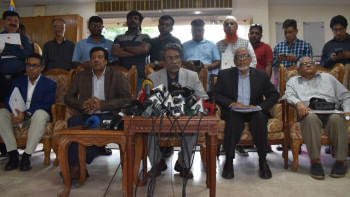Another Galileo to Vibe With
Bangla translation of Bertolt Brecht's Life of Galileo was staged almost two score and eight years back by Nagorik Natya Somprodaya and it immediately created tremendous vibes in the theater arena of Bangladesh, and of course there were multiple reasons for that.
Just to mention a few, in one side it had a strong message against religious fanaticism, war, expropriation of new scientific inventions, exploitation by the privileged class that comprehensibly includes persons belonging to religious institutions and so called elites and, Nagorik on the other. Why Nagorik? Because this very drama group, during the 70s and 80s of the last millennium, had, almost with its lonesome endeavour, undertaken the risk to feed our theatre lovers and activists with world classic plays through translations/adaptations—and that too with considerable success. Added to that was the assemblage of actors per excellence like Aly Zaker, Asaduzzaman Noor, Khaled Khan, Lucky Inam, Kawsar Chowdhury and director like Ataur Rahman—just to name a few.
After almost twenty-four years (almost because I have no exact count of the year and date) Galileo is back on stage—the first performance of the second-coming was on October 5, 2018.The lead-cast has remained the same—Aly Zaker and Asaduzzaman Noor playing the roles of Galileo and Pope respectively, though quite a few new faces were obviously included to play the roles of other dramatis personae. Aly Zaker and Asaduzzaman Noor—both of them being bound to the natural aging process—were under much speculative computation (that included me too) before the play actually was revived on the Bailey Road Mahila Shamity stage. And much to many audiences surprise the ambiance created, especially by those veteran actors, was beyond anybody's apprehension—it was amazing and outstanding. I personally felt the taste of the classic it meant to be.
But then, was there anything missing? It is not at all possible for the generation that is watching this new or another Galileo on the stage now to contrast with the one that we saw during 80s. The first difference that we felt is manifested in its duration. The original Brecht version was a performance of almost three hours. Ataur Rahman, who directed the legendary first translated Galileo in Bangladesh, brought it down to two hours thirty-seven minutes. As a translator I was not happy not only because some of the scenes and dialogues that contained multidimensional significance had been edited, but because one of my most favourite scenes was (Carnival Scene) entirely discarded. But even two hours thirty-seven minutes of performance was an unusually long time by Bangladeshi standard. Surprisingly enough every single audience at that time was glued to their seats till the end of the play. With time this habit of ours has waned—most of us are now conditioned to ninety-minute time-frame or we are overcast with impatience. This is an ominous sign I reckon.
What else are missing? Evidently the crispy consequential dialogues as the play have been slashed down to ninety minutes only. I must say Pantho Shahriar, the director of this new Galileo, as Ataur has disassociated himself from the revived version for some good reasons only known to him, has shown quite a courage to edit the play keeping the storyline and the message undistorted as much as possible. Of course the influence of Ataur's directorial psyche is clearly felt. The other thing that is missing is, in the previous version as the story unfolded the aging process of Galileo, Pope, Andrea and Virginia was so distinctly made evident by Aly Zaker, Asaduzzaman Noor, Khaled Khan and Lucky Inam that I still have my heart set on that.
I take this opportunity to mention one serious erratum that I committed in my write up published on October 6, 2018, titled When Aly Zaker was possessed by Galileo's excellence. I erroneously mentioned there that Galileo had no daughter by the name Virginia. The fact of the matter is, though Galileo was not married throughout his life he had three illegitimate daughters and the eldest was called Virginia. Because of their illegitimacy all three of them were sent to a convent in Arcetri when Virginia was 13. Virginia and Galileo never met after that, though they communicated regularly writing letters.
Revival of Galileo has created a huge vibe among the audience—both old and young but I am not sure if it is genuine or synthetic.
The writer is a theatre activist, playwright and theatre critic. He is also a Bangla Academy awardee for translation

 For all latest news, follow The Daily Star's Google News channel.
For all latest news, follow The Daily Star's Google News channel. 



Comments